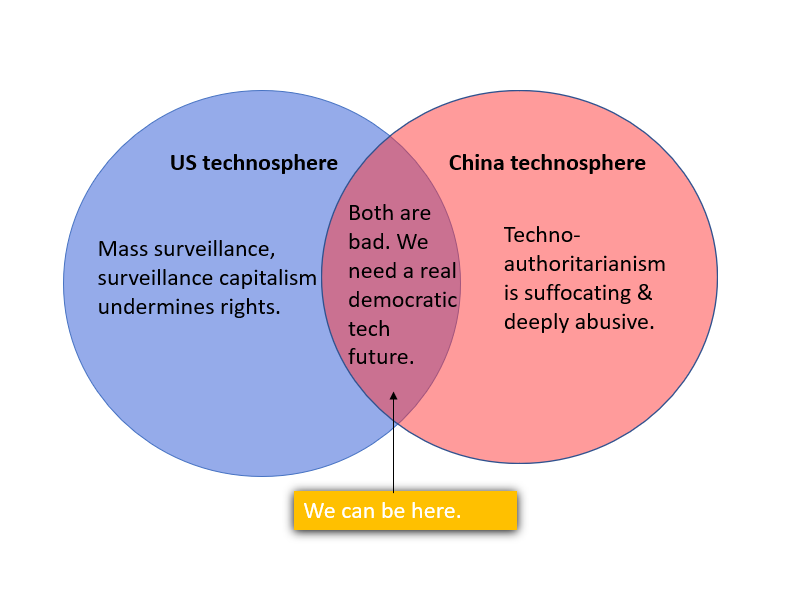Today I published a piece on US-China tech competition. I describe the emergence of a China technosphere, where the values of Beijing’s brand of authoritarianism permeate, a kind of techno-authoritarianism that combines social control & efficiency. https://www.foreignaffairs.com/articles/china/2021-04-08/chinas-techno-authoritarianism-has-gone-global">https://www.foreignaffairs.com/articles/... 1/12
US govt & companies have portrayed themselves as trustworthy alternatives to China-based tech, but their own track record inspires little confidence. To much of the world, the US-China tech competition isn’t good vs evil, but evil vs evil. https://www.hrw.org/news/2019/09/18/us-government-mass-surveillance-isnt-secret">https://www.hrw.org/news/2019... 2/12
Ordinary people using tech are caught between a rock and a hard place of the US vs China technospheres. On the one hand, the rise of techno-authoritarianism; on the other, the dominance of tech giants monetizing our data. Is there a third way? 3/12
The third way is a democratic tech future we all deserve. It is where our privacy is protected through laws, hard-wired in technical standards, made possible through innovations such as data stewardship arrangements. https://www.adalovelaceinstitute.org/wp-content/uploads/2021/03/Legal-mechanisms-for-data-stewardship_report_Ada_AI-Council-2.pdf">https://www.adalovelaceinstitute.org/wp-conten... 4/12
It is a future where worst forms of mass data collection—like facial recognition in CCTV networks-- is stigmatized and outlawed globally. https://www.hrw.org/news/2021/03/12/myanmar-facial-recognition-system-threatens-rights">https://www.hrw.org/news/2021... 5/12
A future where technology augments & revitalizes democratic participation. Proposals exist, like “digital public squares.” Tech-augmented democratic decision-making is already happening in Barcelona under @francesca_bria & in Taiwan under @audreyt. https://www.noemamag.com/the-frontiers-of-digital-democracy/">https://www.noemamag.com/the-front... 6/12
“A democratic substitute for Huawei’s 5G should not be just any 5G company based in a democracy but one that meets human rights standards itself.” No more vague & voluntary tech "ethics," but legally binding rules to hold tech companies accountable. https://www.hrw.org/news/2019/11/18/rules-new-surveillance-reality">https://www.hrw.org/news/2019... 7/12
We appeal to US govt not because it’s got a perfect record, but bcuz it can reverse course. We challenge the dominant narrative that US-China tech competition is merely one about tech prowess (and thus a bonanza for US tech firms). Rather, it should be about values. 8/12
Writing about US-China has become a tight-rope balancing act. That act is to describe China’s tech ambitions accurately without self-censorship nor exaggeration. It requires holding two thoughts at once: that China’s ambitions are horrifying but also chillingly innovative. 9/12
That act is to speak about China’s abuses in the context of US’s rights abuses but without drawing false equivalences between them. That act is about standing up for human rights without bending towards the narrative of those powerful, in China or the US. 10/12
That balancing act is hard but we need to imagine a real democratic technological future for all. Here& #39;s my attempt in summarizing this in a venn diagram: 11/12
This piece has ideas from @He_Shumei @YuanfenYang @jmulvenon @weberv_ @LindsayPGorman. It& #39;s got contributions & edits from wonderful @hrw colleagues @AmosToh @deblebrown @Yaqiu @SophieHRW + @keerthanaanna at @ForeignAffairs. Thx for your thoughtful ideas. 12/12

 Read on Twitter
Read on Twitter


